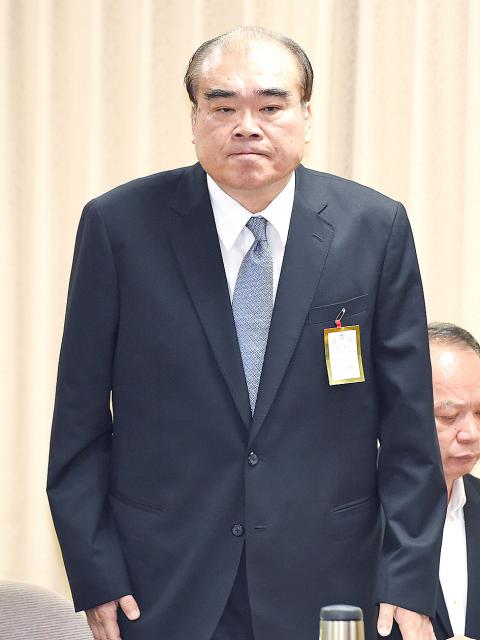Chinese students who contravene laws or regulations in Taiwan would not be allowed re-entry into the nation, National Immigration Agency Director-General Chiu Feng-kuang (邱豐光) said yesterday at the Legislative Yuan.
He made the remark while being questioned by Democratic Progressive Party Legislator Wang Ting-yu (王定宇) at a meeting of the Foreign Affairs and National Defense Committee, of which Wang is a coconvener.
Wang asked Chiu whether, according to regulations, Chinese students who contravene laws or regulations, for example by attacking people on campuses or tearing down so-called “Lennon walls,” would be allowed to re-enter Taiwan after they leave for school holidays.

Photo: Liao Chen-huei, Taipei Times
“If [they] contravene regulations or break the law, we will not let them re-enter,” Chiu said.
Wang said that some Chinese students allegedly hit other students, tore down “Lennon walls” to put up China’s national flag in their place and poured tea on Hong Kong students who were dining at a restaurant.
Would they be allowed to re-enter after they leave, he asked.
“I believe [the agency’s] joint review committee would not agree to let them re-enter,” Chiu said.
This policy “not only protects Taiwanese and Hong Kong students. I believe it also protects Chinese students who really came here to study,” Wang said.
Students who have engaged in such behavior include those from I-Shou University, Chinese Culture University and Shih Hsin University, he added.
In related news, Minister of Education Pan Wen-chung (潘文忠) yesterday called on Chinese students in Taiwan to cherish the freedom of speech and refrain from violence or targeting other students, in the wake of several incidents at universities, where expressions of support for the pro-democracy protests in Hong Kong have resulted in scuffles.
Speaking on the sideline of a legislative committee meeting, Pan said the Ministry of Education has established an ad hoc team to work with local universities, especially those with large numbers of students from China and Hong Kong, to address the issue.
A number of disputes between Hong Kong and Chinese students over the months-long protests in the territory have been reported on campuses.
Pan said the ministry has asked all universities and their campus security report centers to safeguard students’ safety and freedom of speech.
School authorities have also been advised to help the students who had faced verbal abuse or physical violence and wish to take legal action, he added.
“The true meaning of college education is to allow students from different nations engage in exchanges and respect different opinions,” Pan said
The government would not tolerate any violence targeting people exercising their freedom of speech, he added.
Pan’s remarks were made in response to media reports of four incidents late last month; two in which Hong Kong students were confronted by Chinese students for expressing support for the Hong Kong protests, and two others in which materials supporting the demonstrations were torn down from message boards.
On Monday, two “Lennon walls” on National Tsing Hua University’s campus in Hsinchu bearing post-it notes supporting the Hong Kong protests were damaged by unknown people.
About 30,000 Chinese students are enrolled at Taiwanese universities and 7,700 from Hong Kong, ministry data showed.

US President Donald Trump yesterday announced sweeping "reciprocal tariffs" on US trading partners, including a 32 percent tax on goods from Taiwan that is set to take effect on Wednesday. At a Rose Garden event, Trump declared a 10 percent baseline tax on imports from all countries, with the White House saying it would take effect on Saturday. Countries with larger trade surpluses with the US would face higher duties beginning on Wednesday, including Taiwan (32 percent), China (34 percent), Japan (24 percent), South Korea (25 percent), Vietnam (46 percent) and Thailand (36 percent). Canada and Mexico, the two largest US trading

AIR SUPPORT: The Ministry of National Defense thanked the US for the delivery, adding that it was an indicator of the White House’s commitment to the Taiwan Relations Act Deputy Minister of National Defense Po Horng-huei (柏鴻輝) and Representative to the US Alexander Yui on Friday attended a delivery ceremony for the first of Taiwan’s long-awaited 66 F-16C/D Block 70 jets at a Lockheed Martin Corp factory in Greenville, South Carolina. “We are so proud to be the global home of the F-16 and to support Taiwan’s air defense capabilities,” US Representative William Timmons wrote on X, alongside a photograph of Taiwanese and US officials at the event. The F-16C/D Block 70 jets Taiwan ordered have the same capabilities as aircraft that had been upgraded to F-16Vs. The batch of Lockheed Martin

GRIDLOCK: The National Fire Agency’s Special Search and Rescue team is on standby to travel to the countries to help out with the rescue effort A powerful earthquake rocked Myanmar and neighboring Thailand yesterday, killing at least three people in Bangkok and burying dozens when a high-rise building under construction collapsed. Footage shared on social media from Myanmar’s second-largest city showed widespread destruction, raising fears that many were trapped under the rubble or killed. The magnitude 7.7 earthquake, with an epicenter near Mandalay in Myanmar, struck at midday and was followed by a strong magnitude 6.4 aftershock. The extent of death, injury and destruction — especially in Myanmar, which is embroiled in a civil war and where information is tightly controlled at the best of times —

China's military today said it began joint army, navy and rocket force exercises around Taiwan to "serve as a stern warning and powerful deterrent against Taiwanese independence," calling President William Lai (賴清德) a "parasite." The exercises come after Lai called Beijing a "foreign hostile force" last month. More than 10 Chinese military ships approached close to Taiwan's 24 nautical mile (44.4km) contiguous zone this morning and Taiwan sent its own warships to respond, two senior Taiwanese officials said. Taiwan has not yet detected any live fire by the Chinese military so far, one of the officials said. The drills took place after US Secretary